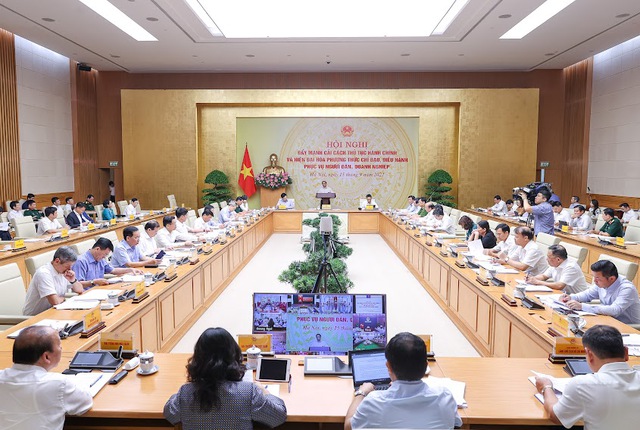Vietnam targets 90% of citizen satisfaction with public services by 2025
Vietnam needs greater efforts for administrative reform and modernizing the state apparatus’ operation to avoid lagging behind other countries.
Localities and Government agencies are expected to raise the rate of public satisfaction toward their respective performance in realizing administrative procedures to at least 80% in 2023, and over 90% by 2025.
| Prime Minister Pham Minh Chinh at the meeting. Source: VGP |
Prime Minister Pham Minh Chinh stressed during a national conference today [September 15] on promoting administrative reform in the interests of the people and businesses.
Chinh also called for increasing the rate of locals using public online services to 50% by the end of 2023.
“The immediate goal should be for each family to have at least one member capable of using online public services,” Chinh said.
“In the long term, the Government should further raise public awareness and change their habits toward the use of online services,” he added.
According to Chinh, administrative reforms remain a key task for the Government to realize socio-economic objectives, especially as Vietnam is promoting an independent and self-reliant economy with active global integration.
“Everything is for the benefit of the people,” Chinh added.
The prime minister, however, pointed out several shortcomings in administrative performance, including the lack of resources in certain provinces/cities for administrative reform.
“Administrative procedures in some economic fields continue to be a hindrance for growth, causing public frustration,” Chinh said, adding the reform process has not mobilized the participation of associations, businesses, and people.
Meanwhile, the not-so-user-friendly online public services are resulting in a modest rate of 9.51% of people using the services in 2021, and over 18% in the first eight months.
Chinh noted the modernization of state governance is a key task for Vietnam to create breakthroughs in development, focusing on creating a favorable business environment, and promoting national digitalization toward a digital economy and society.
| Overview of the meeting. |
“Without greater efforts for administrative reform and modernizing the state apparatus’ operation, Vietnam would risk lagging behind in development at a time when the country should take every opportunity to grow,” Chinh stressed.
As such, Chinh called for the Government to work with the motto of taking the people and businesses at the center of its services, and their satisfaction as the gauge of the performance of agencies and local governments.
At the meeting, Minister and Chairman of the Government Office Tran Van Son noted to date, the Government has simplified 1,700 regulations and over 1,100 business conditions.
The Government is currently providing 3,805 online public services at advanced stages of three and four out of the four-scale level. Over 2.8 million users have registered the service, up 2.8 times against 2021; 4.78 million documents were processed, tripling the amount year-on-year; and 2.6 million online transactions for administrative services worth VND2.78 trillion (US$117.7 million), up 16 times year-on-year.
In addition, the Government has put into operation the national database on citizens for nearly 100 million people and issued 68 million chip-based ID cards.
In 2021, Hanoi’s Public administrative reform index (Par Index) earned 88.54 points and ranked 10th out of 63 provinces and cities, with improvements seen in the quality of state governance; administrative reform; public finance reform and modernization; and evaluation of the impacts of administrative reform to the people, organization and socio-economic development. Hanoi also scored over 80% in the Satisfaction Index of Public Administration Services (SIPAS) in 2021, marking the fourth consecutive year that the city continued to stay among the top-tier ranking. |













